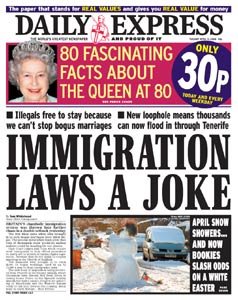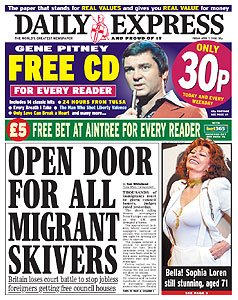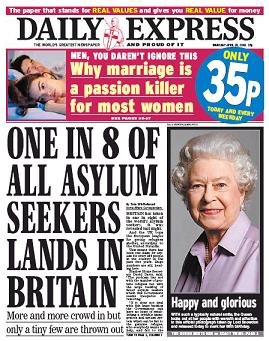An open letter to Charles Clarke.
Dear Charles Clarke,
Having read your speech today to the LSE, in which you focus your attention on civil liberties and the media, you say that a "pernicious and even dangerous poison" is now slipping into some parts of the media view of the world, following the fall of the Soviet Union and the peaceful end of apartheid. You go on to say that commentators routinely use language such as "fascist", "police state", 'hijacking our democracy', 'creeping authoritarianism' and 'destruction of the rule of law'.
Of course, you are fully entitled to your view. However, I would like you to personally point where any mainstream media commentator has described, not alluded to, your government as "fascist". I would like to see where it has been described as a "police state". Pub debate might use such words, as might those on internet message boards, but I would like to see you show me them in the broadsheet press as you apparently describe, directly accusing the government of being such. Then you go on to "hijacking our democracy", "creeping authoritarianism" and "destruction of the rule of law". While the first and last are more difficult to prove and rather more of an exaggerated criticism, what would you personally describe your government's policies as, other than as "creeping authoritarianism"? Common sense, perhaps? What would you call a government that wished to lock up suspects for up to 90 days without trial, by far the longest period that would be allowed in the Western world, and certainly in Europe, other than authoritarian? I could list other policies of your government which I would describe as authoritarian, but I will move on.
Later in your speech you make a reference to Simon Carr's article in the Independent. To quote you:
No, the city of London isn't a designated area. Within a mile of Parliament is a designated area however, as you well know. As for the t-shirt, what about the case of John Catt, who was stopped for wearing a t-shirt which read "Bush Blair Sharon to be tried for war crimes torture human rights abuse"? He was stopped and searched under the reason "terrorism", aka the infamous section 44 of the Terrorism act. The form filled out by the police officer read carrying "plackard [sic] and T-shirt with anti-Blair info". In the eyes of that police officer, protesting against this government seems to give reason to suspect that person of terrorism.
And isn't that really the problem? The laws you passed have been vague, badly drafted and then abused by the police. I'd like to think when the Terrorism act was drawn up that the last thing the ministers would thought it would be used for would be harassing demonstrators, such as the man above. Yet that is what is increasingly happening.
You go on to mention the national identity scheme, and challenge what you regard as myths. You say:
It will not include medical records. Perhaps you would like to take this opportunity to deny yesterday's report in the Sunday Times that people will be encouraged to do exactly the opposite:
Yes, it will be voluntary. Yet wasn't that what your manifesto promised about ID cards themselves? It was only thanks to a compromise between the Lords and the Houses of Parliament that that was (barely) carried through. You yourself tried every trick possible to get the cards to be compulsory after 2010.
Again, you go on to talk about how spontaneous protests outside parliament are now banned:
Excuse me for missing the point, but isn't the banning of demonstrations, the arrest and possible imprisonment as a result of simply exercising a democratic right in what is a public place absolutely alien to what a democracy should be? It's very nice that we can get permission within 24 hours rather than six days, but that means nothing to the likes of Milan Rai who was convicted of reading out the names of the Iraqi war dead at the cenotaph. Should someone have a criminal record for doing something so slight, and what you yourself did similiarly in the past? You mention there have been 157 demonstrations since the law came into effect. How many of those were actually within the law and fully authorised by the police? I somehow doubt that every single one was. Indeed, if they weren't, then why haven't those people been prosecuted like Maya Evans? Or have the police simply taken photographs of them for their records? You also don't mention that megaphones are completely banned from such demonstrations, which are vital tools for addressing a crowd. Isn't that a basic infringement of liberties?
I could go on, but I suspect you have better uses of your time, and so do I. However, I'd like to leave you with a reminder of some of the other media which graces our newsagents. In your attacks and disagreements with the Observer, Guardian and Independent, you don't mention the likes of the Sun, Express and Daily Mail. Could this be because they are broadly supportive of your measures, while the above have been mildly critical? I may be being slightly glib, but Tony Blair seems almost to believe that anything that the Sun newspaper supports the public supports. Blair and the Sun were vociferous in support of the 90 day detention without trial part of the last Terrorism act. The Sun called those who voted against it "traitors". It did so on its front page. Isn't that a more worrying example of poisonous language, only likely to make those who read it even more cynical and dismissive of politicians? Now Blair seems to think that his proposed changes, such as that on drug dealers, are also supported by the public and that the "liberal" media are out of touch. Again, it seems likely that the Sun would support him.


 I look forward to when you dedicate a speech to correcting the likes of the above over their distortions, falsehoods and downright lies. I expect I'll be waiting a long time, as that's unlikely to win votes and the support of the populists, as opposed to bashing the Guardian and Independent will in the battle for the minds of Rupert Murdoch and Paul Dacre.
I look forward to when you dedicate a speech to correcting the likes of the above over their distortions, falsehoods and downright lies. I expect I'll be waiting a long time, as that's unlikely to win votes and the support of the populists, as opposed to bashing the Guardian and Independent will in the battle for the minds of Rupert Murdoch and Paul Dacre.
Yours,
Obsolete.
Having read your speech today to the LSE, in which you focus your attention on civil liberties and the media, you say that a "pernicious and even dangerous poison" is now slipping into some parts of the media view of the world, following the fall of the Soviet Union and the peaceful end of apartheid. You go on to say that commentators routinely use language such as "fascist", "police state", 'hijacking our democracy', 'creeping authoritarianism' and 'destruction of the rule of law'.
Of course, you are fully entitled to your view. However, I would like you to personally point where any mainstream media commentator has described, not alluded to, your government as "fascist". I would like to see where it has been described as a "police state". Pub debate might use such words, as might those on internet message boards, but I would like to see you show me them in the broadsheet press as you apparently describe, directly accusing the government of being such. Then you go on to "hijacking our democracy", "creeping authoritarianism" and "destruction of the rule of law". While the first and last are more difficult to prove and rather more of an exaggerated criticism, what would you personally describe your government's policies as, other than as "creeping authoritarianism"? Common sense, perhaps? What would you call a government that wished to lock up suspects for up to 90 days without trial, by far the longest period that would be allowed in the Western world, and certainly in Europe, other than authoritarian? I could list other policies of your government which I would describe as authoritarian, but I will move on.
Later in your speech you make a reference to Simon Carr's article in the Independent. To quote you:
Or what about the statement: "People wearing satirical T-shirts in a "designated area" may be arrested under the Prevention of Terrorism Act. The City of London is a permanently 'designated area'". Wrong again. There is no such provision in any Prevention of Terrorism Act. Nor is there any law against bad taste in t-shirts as long as they do not, for example, incite murder.
No, the city of London isn't a designated area. Within a mile of Parliament is a designated area however, as you well know. As for the t-shirt, what about the case of John Catt, who was stopped for wearing a t-shirt which read "Bush Blair Sharon to be tried for war crimes torture human rights abuse"? He was stopped and searched under the reason "terrorism", aka the infamous section 44 of the Terrorism act. The form filled out by the police officer read carrying "plackard [sic] and T-shirt with anti-Blair info". In the eyes of that police officer, protesting against this government seems to give reason to suspect that person of terrorism.
And isn't that really the problem? The laws you passed have been vague, badly drafted and then abused by the police. I'd like to think when the Terrorism act was drawn up that the last thing the ministers would thought it would be used for would be harassing demonstrators, such as the man above. Yet that is what is increasingly happening.
You go on to mention the national identity scheme, and challenge what you regard as myths. You say:
The National Identity Scheme is being introduced to safeguard people's identities, not track their lifestyle or activities. The information that can be held on the National Identity Register covers only basic personal information roughly the same as that needed for a passport. It will not include details of withdrawals of cash from bank accounts, medical records or even whether someone has obtained a fishing licence.
It will not include medical records. Perhaps you would like to take this opportunity to deny yesterday's report in the Sunday Times that people will be encouraged to do exactly the opposite:
IDENTITY cards are to carry medical details, despite repeated government assurances that concerns about privacy meant it would not happen.
A minister at the Home Office disclosed it wants people to put personal health information on the cards to give doctors information for emergencies.
Card-holders will be urged to volunteer details of blood group, allergies, and whether they wish to donate organs. Ministers stressed there would be no compulsion.
Andy Burnham, a junior Home Office minister with responsibility for promoting ID cards, said there was an “impressive benefits case” for use of the cards by the NHS.
Yes, it will be voluntary. Yet wasn't that what your manifesto promised about ID cards themselves? It was only thanks to a compromise between the Lords and the Houses of Parliament that that was (barely) carried through. You yourself tried every trick possible to get the cards to be compulsory after 2010.
Again, you go on to talk about how spontaneous protests outside parliament are now banned:
For example, on whether "People can protest in Parliament Square only with the written permission of the police. Where 'reasonably practical', six days notice must be given." But what is not added is that in some cases 24 hours notice is sufficient. Or that since the legislation came into effect last August, 157 demonstrations have taken place in Parliament Square ranging from human rights in Burma to a protest about the right to protest itself. Organisers of demonstrations must give prior notice to the Commissioner of the Metropolitan Police, who is then obliged to authorise the demonstration although he may attach conditions to the authorisation where it is necessary. This is more or less the same as the situation that prevailed in the 1970s when I myself organised demonstrations in Parliament Square.
Excuse me for missing the point, but isn't the banning of demonstrations, the arrest and possible imprisonment as a result of simply exercising a democratic right in what is a public place absolutely alien to what a democracy should be? It's very nice that we can get permission within 24 hours rather than six days, but that means nothing to the likes of Milan Rai who was convicted of reading out the names of the Iraqi war dead at the cenotaph. Should someone have a criminal record for doing something so slight, and what you yourself did similiarly in the past? You mention there have been 157 demonstrations since the law came into effect. How many of those were actually within the law and fully authorised by the police? I somehow doubt that every single one was. Indeed, if they weren't, then why haven't those people been prosecuted like Maya Evans? Or have the police simply taken photographs of them for their records? You also don't mention that megaphones are completely banned from such demonstrations, which are vital tools for addressing a crowd. Isn't that a basic infringement of liberties?
I could go on, but I suspect you have better uses of your time, and so do I. However, I'd like to leave you with a reminder of some of the other media which graces our newsagents. In your attacks and disagreements with the Observer, Guardian and Independent, you don't mention the likes of the Sun, Express and Daily Mail. Could this be because they are broadly supportive of your measures, while the above have been mildly critical? I may be being slightly glib, but Tony Blair seems almost to believe that anything that the Sun newspaper supports the public supports. Blair and the Sun were vociferous in support of the 90 day detention without trial part of the last Terrorism act. The Sun called those who voted against it "traitors". It did so on its front page. Isn't that a more worrying example of poisonous language, only likely to make those who read it even more cynical and dismissive of politicians? Now Blair seems to think that his proposed changes, such as that on drug dealers, are also supported by the public and that the "liberal" media are out of touch. Again, it seems likely that the Sun would support him.


Yours,
Obsolete.
Post a Comment